Archived Entries

Items to Consider Stockpiling After Food and Water
After you have stockpiled sufficient food and water you will want to stockpile Fuel, Heat, and Light sources.
You don’t ever want to be dependent on just 1 or 2 sources of fuel.
- Firewood –- wood takes about 6 – 12 months to become dry for a fire / heat source.
- Propane – propane and propane tanks are readily available but will become scarce.
- Coal – another source of heat.
- Gasoline
- Charcoal
- Lanterns, mantles, fuel
- Lighters, lighter fluid, oil lamps, lamp oil and wicks.
- Stick matches, tinder, butane torch, flares.
- Fire extinguishers / baking soda.
- A quality ax and hatchet.
- A quality first aid kit.
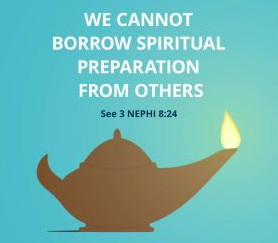
Faith in the Lord: An Important Component of Preparedness
The first principle of the gospel is faith in the Lord Jesus Christ (Articles of Faith 1:4).
"And neither at any time hath any wrought miracles until after their faith; wherefore they first believed in the Son of God" (Ether 12:18).
"By faith Noah, being warned by God concerning events as yet unseen, in reverent fear constructed an ark for the saving of his household" (Hebrews 11:7).
The Book of Mormon states, "… faith is things which are hoped for and not seen; wherefore, dispute not because ye see not, for ye receive no witness until after the trial of your faith" (Ether 12:6).
A pattern of the Lord is to challenge us to do difficult things, and to demonstrate our faith when it may seem unconventional, and perhaps go against what we my think is reasonable.
A significant way we can demonstrate our faith in The Lord and our obedience is by "… preparing every needful thing …" (D&C 88:119). A few of those needful things you may need to prepare for your household may include:
- Age-based needs of individual family members
- Households with school-aged children or elderly
- Special dietary needs
- Medical needs including prescriptions and equipment
- Disabilities, devices and equipment
- Pets or service animals
- Responsibilities for assisting neighbors and others
- Other considerations

Destructive Winter Storms and Power Outages
We have seen and heard of the severe weather that has been happening around the world so far this New Year. It is extremely important to plan ahead for any kind of storms/weather or disasters.
Being prepared can ease our minds and give us the ability to be more productive in our lives because we are prepared.
With power outages it’s important to realize we could be without heat, cooking abilities and lighting. Please study this out, purchase items you will need for this type of emergency, and practice with them so you know how to use them if and when the time comes that we need them.
- Winterize your home.
- Stock up on food and water, stoves (propane, wood, butane, matches) - different ways to cook and heat your home.
- Set aside warm winter clothing for all family members, especially growing children. Layer clothing.
- Gather flashlights, candles, lanterns, matches, radios and other necessities such as blankets.
- Condense your living space. Block any drafts from entering your home.
- Keep doors to the outside closed. Cover windows and close blinds at night.
- Look for broken or damaged piping.
- Pray for guidance and have faith.
- "If ye are prepared ye shall not fear."

Preparing for Disaster
Prior to a disaster:
- Find a location for storing and accessing important family documents, emergency funds, survival and emergency supplies, and food storage
- Set up a safe family gathering place that coincides with the ward and stake or community reunification plans
- Establish ways to communicate with each other about your safety in case you are separated during the disaster.
- Make an Emergency Information Card for any children in your home with basic identification, medical and contact information, and information to stay in contact in a disaster.
- Pack an emergency bag for each member of the family with things such as: basic hygiene items, clothing, a light source, snacks, activities, and a comfort item to help children feel safe.
Immediately after a disaster:
- Help to locate and reunite family members who have become separated from the rest of the family. Attend to any immediate needs.
- Determine and report to ministering brothers or sisters or other Church leadership the condition of each family member.
- Obtain medical care for those who have been injured or who have other health challenges.
- Ensure you have access to a supply of basic provisions and services—such as food, temporary shelter, sanitation, and clothing.
Soon after a disaster:
- Provide assistance to family members who are suffering, have damaged shelter or belongings, or who are experiencing emotional trauma or loss of livelihood.
--From the Personal and Family Emergency Preparedness Planning Guide.

Reducing Stress and Anxiety
Due to the turbulence and uncertainty that surround us in these last days, it is easy to become stressed, anxious, irritable, and even seriously depressed. Sometimes it may seem that the forces of evil are winning and the future is bleak. We must guard against these negative emotions and never forget that the Savior is in control and good wins in the end. Alma 7:1-12 reminds us that Jesus Christ took upon Himself "the pains and the sicknesses of his people ... that he may know according to the flesh how to succor his people."
The Church recommends a number of activities that may help you preserve or regain your hope and lift your spirits. They are as follows:
- Pray.
- Read an inspiring book,story, or poem.
- Take a short break—take deep breaths and stretch.
- Do a physical activity.
- Take a break from social media, internet, and TV.
- Talk to yourself with kind, comforting words—the way you would talk with a friend.
- Help someone else.
- Do something relaxing, such as reading, listening to music, or going outside.
- Stay connected with friends and family.
- Take it one step at a time.
- Journal your thoughts and feelings.
- Write down meaningful memories of when you felt peace, joy, and love.
- Drink water and eat healthy foods.
- Seek accurate information for the problem.
- Focus on what is most important to you.
- Talk with a friend who is a good listener.
- Do something you love outdoors.
- Schedule a time to do something with friends or family.
- Accept that challenges are part of God’s plan for us.
Next time you or a loved one are feeling down, try one or more of these methods. And never forget to count your blessings express gratitude to the Lord for them. No matter how hopeless things may seem at the moment, God has not forsaken you and never will. In the long run, "all these things shall give thee experience and shall be for thy good" (D&C 122:7). Don't give up. Stay the course, keep the commandments, trust in the Lord's wisdom and His timing, and you will make it through.

Live Within Your Means
It is needful that we discipline ourselves by avoiding debt and living within our means. Doing so will put us in a better position to help ourselves and help others during times of personal or widespread crisis.
President N. Eldon Tanner said, "I have discovered that there is no way that you can ever earn more than you can spend. I am convinced that it is not the amount of money an individual earns that brings peace of mind as much as it is having control of his money. Money can be an obedient servant but a harsh taskmaster. Those who structure their standard of living to allow a little surplus, control their circumstances. Those who spend a little more than they earn are controlled by their circumstances."
Living within our means allows us to maintain control of our circumstances. Falling into debt only leads to further hardship.
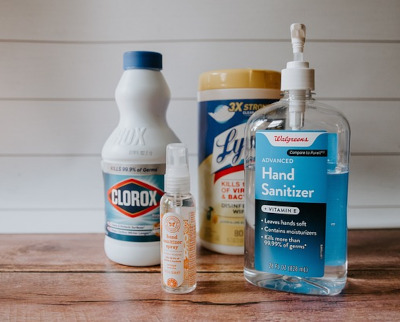
Sanitation Is Critical
After a disaster, it is very common for people to get sick and even die due to poor sanitation. In a long-term emergency there may not be a weekly trash pick-up, your tap water may be off or contaminated, and you may not be able to flush the toilet. Insects, mice, and rats may be attracted to garbage piles. Worse yet, medical care may not be available if you become ill. What would you do in such a situation?
It is important to have a supply of clean water for drinking and washing, as well as a way to filter and/or boil your water. Soap, shampoo, and hand sanitizer are also necessary to have on hand.
Other important sanitation items for your emergency supply may include:
- Toilet paper
- Bleach
- Disinfecting wipes
- Toothbrushes, toothpaste, and antibacterial mouthwash
- Feminine hygiene products
- Diapers and wipes for babies
- Laundry detergent
- Dish soap
- Trash bags and trash cans
- Paper towels
- A portable toilet
- A shovel to bury waste
A little effort now to collect sanitation supplies may save your health or your life when the inevitable disaster strikes!

Harvest Time
When it's time to harvest your garden, here are a few tips to allow you to have fresh vegetables during the winter.
Pick your green tomatoes before the frost gets them. Any tomatoes that have a little color in them will generally ripen. Find a cool place where it won't freeze. Spread your tomatoes in a single layer on a table so they can ripen. Any tomatoes that start to spoil can be tossed into the compost bin or fed to the chickens. Another option is to pull up the whole plant, leaving the tomatoes on the vine, and store them in a cold but not freezing area such as the garage.
Carrots can be left in the ground if you put a foot of straw on top of them to protect them from the frost. When you want some carrots, just move some straw, dig what you need, and replace the straw. In the early spring, dig out the remaining carrots and use them fresh, or freeze or dehydrate them. To grow your own seeds, leave 4 or 5 carrots in the ground and harvest the seed in the fall. Scarlet Nantes and Danver Half Long are good varieties for saving carrot seeds.
One way to store potatoes for the winter is to put them in a large cooler in the garage. Potatoes need to 'breathe,' so keep the cooler lid propped open an inch or so. On a really cold winter night you may want to close the lid, but prop it back open in the morning.
You can extend the life of your winter squash by dipping a paper towel in vegetable oil and rubbing the squash down with the oil, especially in the stem area. Then you can store the squash all winter in a cool area such as the basement.
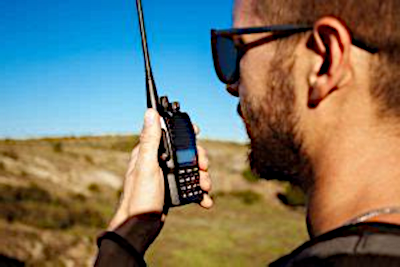
Emergency Communications
What would you do if disaster struck while you were at work or your children were at school? How would you find out if your loved ones were okay? How could you contact them if phone service stopped working or the power went out? Who else would you want to contact in an emergency? Do you have a list of important phone numbers and emails on paper? These are all important things to think about as part of your emergency preparedness. A very helpful resource to get you started on an emergency communication plan can be found in the Church's online Emergency Preparedness Plannng Guide.
If you don't have a family emergency communication plan, we urge you to start one today!

Self Reliance
President Thomas S. Monson taught that self-reliance — "the ability, commitment, and effort to provide the necessities of life for self and family" — is an essential element of our temporal and spiritual well-being.
A mere desire to become self-reliant is not enough. We must make a conscious, active effort to provide for our own needs and those of our families.
Bishop H. David Burton reminded us that when we have done all we can to be self-reliant, "we can turn to the Lord in confidence to ask for what we might yet lack."
Being self-reliant allows us to bless others. Elder Robert D. Hales said, "Only when we are self-reliant can we truly emulate the Savior in serving and blessing others."
Self-reliance involves several facets of a balanced life, including (1) education, (2) health, (3) employment, (4) family home production and storage, (5) family finances, and (6) spiritual strength.

Education for Better Work and Self-Reliance
Stake Self-Reliance Class: The Glory of God is Intelligence! This course will cover subjects like Educational Principles, Skill and Habits. Some topics are: you have Divine Potential, Education is a Bridge to Self-Reliance, Know how much income you need to become Self-Reliant, and Begin Your Self-Reliance Plan. Your plan may include understanding the job market, choosing your education to support your goals, prioritizing and managing your educational goals, preparing for the workforce, and starting your job search. You will receive a helpful workbook at the beginning of the course. This course will take about 10 to 12 weeks to complete with one class once a week. For more information, contact the ward Self-Reliance Coordinator, Bob Wright, at (435)610-6202.
Starting and Growing My Business for Self-Reliance
Stake Self-Reliance Class: My Readiness for Business Success is a foundational principle of salvation. Business principles, skills, and habits will be discussed. Some topics include: Acting on Correct Principles, Why to Start or Grow a Business, Assessing My Personal Readiness for Business Ownership, Organizing My Business Planning, etc. You will review gospel principles that will help in all areas of your life. You will receive a helpful workbook at the beginning of the course. This course will take about 10 to 12 weeks to complete with one class once a week. For more information, contact the ward Self-Reliance Coordinator, Bob Wright, at (435)610-6202.
Emotional Resilience for Self-Reliance
Stake Self-Reliance Class: You will be part of something wonderful. Your efforts will help lead a small group of individuals to become more emotionally resilient by living gospel principles and learning practical skills. Emotional values and skills relate to the following principles: What Is EmotionalResilience?, Accepting Challenges as a Part of God’s Plan for Us, Using Agency to Act Responsibly, the Blessings of Change, Expressing Gratitude Daily, and other important topics. This group is for educational purposes only. It is not group therapy or professional treatment for mental health issues. You will review gospel principles that will help in all areas of your life. You will receive a helpful workbook at the beginning of the course. This course will take about 10 to 12 weeks to complete with one class once a week. For more information, contact the ward Self-Reliance Coordinator, Bob Wright, at (435)610-6202.
Find a Better Job for Self-Reliance
Stake Self-Reliance Class: Act in Faith + Work Hard + Work Smart = Success! Together with your group, and aided by the guidance of the spirit, you will learn why faith is the foundation of a job search, and you will be challenged to work hard. You will also learn the skills needed to work smart, such as networking, matching your skills to employer needs, power statement, written materials, interviewing skills, and more. At the beginning of each meeting, you will review a gospel principle that will help in all areas of your life. You will receive a helpful workbook at the beginning of the course. This course will take about 10 to 12 weeks to complete with one class once a week. For more information, contact the ward Self-Reliance Coordinator, Bob Wright, at (435)610-6202.
Personal Finances for Self-Reliance
Stake Self-Reliance Class: Becoming a wise and faithful steward relating to financial principles and skills, with the foundation principle of salvation. Key principles are paying tithes and offerings, continuing to give and to bless others, saving and investing for the future, eliminating debt, and protecting your family from hardship through a working budget. You will receive a helpful workbook at the beginning of the course. This course will take about 10 to 12 weeks to complete, with classes held once a week. For more information, contact the ward Self-Reliance Coordinator, Bob Wright, at (435)610-6202.
BYU Pathway Worldwide
Millions of Church members throughout the world don’t have a degree. Why? Because it costs too much, they lack confidence, or they don’t have access to quality higher education. With BYU-Pathway Worldwide, one can access higher education. Each term, students take a manageable course load of academic and religious educations. All course credits count toward future certificates and degrees offered through BYU-Pathway Worldwide, in partnership with BYU-Idaho. Classes are scheduled on a semester based on the common college / university schedule. For more information contact Bob Wright at (435)610-6202, or visit byupathway.lds.org online.
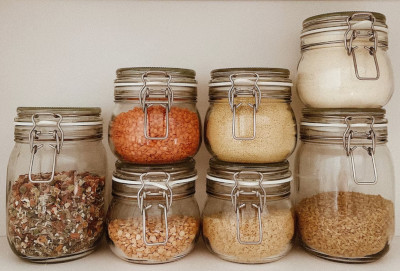
28 Foods That Store for up to 30 Years
When stored in a cool, dry, dark place, these foods can be kept fresh for decades with minimal loss of nutritional content:
- Dried rice
- Dried kidney beans
- Dried pinto beans
- Dried black beans
- Wheat berries (make sure you have a flour grinder)
- Salt
- Raw honey
- Sugar
- White vinegar
- 100% raw maple syrup
- Ghee (clarified butter that doesn’t require refrigeration)
- Corn starch
- Soy sauce
- Pure vanilla extract (the real stuff, not imitation)
- Apple cider vinegar
- Baking soda
- Chicken bouillon cubes and Beef bouillon cubes
- Raw cocoa powder
- Corn syrup
- Popcorn
- Dried pasta
- Instant dry potato flakes
- Oatmeal
- Dried lentils
- Brown sugar
- Jell-O (with the sugar added, not sugar-free)
- Dried powdered milk
- Dehydrated hash browns
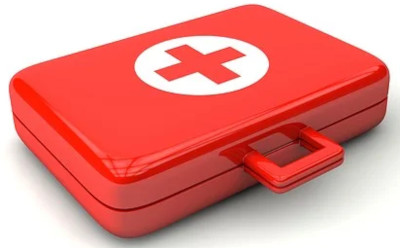
A Basic Building Block of Preparedness – Your First Aid Kit
No home, vehicle, or bug-out location should be without a first aid kit. You can purchase a pre-assembled kit or fill a bag or backpack yourself with the necessary supplies. For a list of the contents, we turned to the experts in disaster relief.
16 supplies the American Red Cross recommends for a family of four:
- Twenty-five adhesive bandages (various sizes)
- Ten sterile gauze pads (multiple sizes)
- Five packets of antiseptic wipes
- Five packets of antibiotic ointment
- Two triangular bandages
- Two pairs of non-latex gloves
- Two packets of hydrocortisone ointment
- Two compress dressings
- One three-inch gauze roll bandage
- One four-inch roller bandage
- One 10-yard roll of cloth tape
- One breathing barrier (for CPR use)
- One folding emergency blanket
- One (or more) instant cold compress
- A set of tweezers
- An emergency first aid guidebook
In addition to the 16 supplies recommended by the American Red Cross listed above, you might consider including:
- Adhesive tape
- Superglue
- Tourniquet
- Eyeshield or eye pad
- Finger splints
- Cotton balls and swabs
- Duct tape
- Petroleum jelly
- Plastic zippered bags, assorted sizes
- Large plastic trash bags
- Safety pins (various sizes)
- Scissors
- Hand sanitizer
- Eyewash solution
- Medical thermometer
- Bulb suction device (a turkey baster will do nicely)
- Sterile saline solution
- Face masks
- Medicine cup or spoon or syringe
- Hydrogen peroxide
- Magnifying glass
- Needle and thread
- Medical stapler and staple remover
- Dental mirror
Other emergency items may also include:
Personal prescriptions, aloe vera gel, calamine lotion, anti-diarrheal medication (such as Loperamide), laxative, antacids, antihistamine (such as diphenhydramine), hydrocortisone cream, cough and cold medications, auto-injector of epinephrine (epi-pen) if prescribed for a member of your family, pain relievers (such as acetaminophen and ibuprofen), aspirin (Aspirin can be life-saving in an adult with chest pain. However, do not give aspirin to children and don’t take aspirin if you take blood-thinning medication or have issues with bleeding.), lidocaine cream, pedialyte (Electrolyte powders), stomach gas reducer (Simethicone), fiber powder (Metamucil), zinc, vitamin C, vitamin D, multivitamins, disinfectant mouthwash, burn gel or cream.
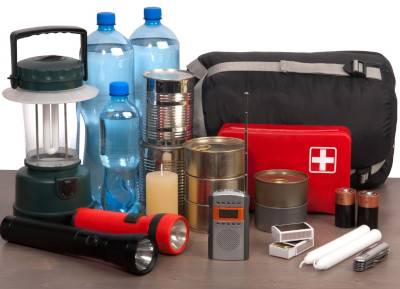
Emergency Supply Kit
Things you should have in your emergency 72-hour or bug-out kit:
- Water, one gallon of water per person per day for at least three days, for drinking and sanitation
- Food, at least a three-day supply of non-perishable food
- Battery-powered or hand crank radio with extra batteries for both
- Flashlight and extra batteries
- First aid kit and book
- Whistle to signal for help
- Dust mask, to help filter contaminated air and plastic sheeting and duct tape to shelter-in-place
- Moist towelettes, garbage bags and plastic ties for personal sanitation
- Wrench or pliers to turn off utilities
- Can opener for food
- Cell phone with solar charger
- Prescription medications and glasses
- Infant formula and diapers
- Pet food and extra water (if you have a pet)
- Family documents – (ex. copies of insurance policies, identification & bank account records in a waterproof, portable container).
- Cash
- Sleeping bag or warm blanket for each person and additional bedding for a cold-weather climate.
- Complete change of clothing including additional clothing if you live in a cold-weather climate.
- Household chlorine bleach and medicine dropper – When diluted nine parts water to one part bleach, bleach can be used as a disinfectant. Or in an emergency, you can use it to treat water by using 16 drops of regular household liquid bleach per gallon of water. Do not use scented, color safe or bleaches with added cleaners.
- Fire Extinguisher
- Matches in a waterproof container
- Feminine supplies and personal hygiene items
- Mess kits, paper cups, plates and plastic utensils, paper towels
- Paper and pencils, books, games, and puzzles for children

Everyday Carry Gear
Regularly, you or a loved one leaves your residence and is gone from the home for a period of time. However, your food storage, your water and other preparedness gear is at home.
Everyday Carry Gear is gear you should keep on you at all times, or have access to quickly when you leave home. These items can be carried on your person, in a small bag or backpack, or in a bag in your vehicle. The idea is that you want to be able to have “the basics” covered if you were unable to return home immediately.
Food
Ideally, you will need food that is easily portable and calorie dense which will last you for 3 days (72 Hours). The food that you carry should have an extended shelf life that is nutritious, portable, and doesn’t require refrigeration or heating. Beef jerky, canned meats, and peanut butter are excellent choices. MREs (Meals Ready to Eat) are another example of nutritious, pre-packaged food with an extended shelf life.
Water
Water is more critical to carry than food because you can only survive without water for a few days. Water is also important for maintaining personal hygiene which will help you to feel better about yourself. The ideal container to hold water is a stainless steel container. However, a collapsible water bottle would be helpful. Although you may not be able to keep sufficient water for 3 days with you, you may consider water purification tablets, or acquire a “Life Straw,” or similar item where you can safely retrieve water from rivers, lakes, etc. without becoming ill.
Fire and Light
Having a light source is important to carry because you will need a dependable way to see if you out in the evening. You should have a dependable flashlight and extra set of batteries or a headlamp, a solar light or lantern, and perhaps some glow sticks.
You may need to build a fire to stay warm or as a means to be found if lost. Additionally, a fire can provide light, warmth, protection/security, and the ability to cook food or boil water. We would suggest having a lighter, matches and a flint.
Shelter and Clothing
Always carry an extra set of clothes, which should include extra socks and shoes. An all-weather blanket would be helpful because they are moisture resistant and retain 80 percent of body heat. A poncho would be important to have in inclement weather, and the poncho and a tarp you could make a shelter with it if necessary.
Other Gear
Other important items and gear would be to have some way to communicate (cell phone, walkie talkie, etc.) sufficient cash, any necessary medications, a whistle, First aid kit, work gloves, a knife, a jacket, a multi-tool, duct tape, and a way to defend yourself.

Wildfire
Wildfire is one of the biggest threats to the Fairview area. On multiple occasions in the past the town has been evacuated due to fire, and numerous buildings have burned.
Here are some tips to help keep you safe in the event of a wildfire.
- If the air is smoky, close doors and windows and turn off air conditioning to keep the smoke out.
- Moving to an interior room without windows and closing the door can help minimize smoke exposure.
- A portable air cleaner or filter can keep the air clean in a room even if the rest of the house is smoky.
- Avoid making the air worse by using candles, woodburning stoves, frying meat, etc.
- Bring pets inside if possible. They are affected by smoke too.
- Pay attention to any health symptoms, especially if you have asthma, heart disease, or are pregnant.
- Check the Fire and Smoke Map online to see where fires are burning.
- Be prepared for power outages, which are common during wildfires.
- Have a family disaster plan so you know what to do, where to go, and whom to contact if you are evacuated.
- Prepare a family 72-hour kit, keep it updated, and store it where you can easily grab it in an emergency.
- Watch for Emergency Alert broadcasts on your phone, TV, or radio. Follow any instructions given.
- If you are asked to evacuate, do so and do it quickly. Your life is more valuable than your possessions.

Water
Water is so essential to our bodies we can only live a few days without it. Water storage experts suggest storing a minimum of 2 gallons of water per person, per day of clean, potable water for drinking, basic hygiene and cleaning purposes.
Always ensure your water comes from a clean source, or is filtered and purified before using it to wash dishes or your body. Dirty water can appear to be crystal clear and still be filled with harmful disease, bacteria and chemicals. You can make your water safe to use and drink by using Puritabs, iodine, boiling, or filtering.
You may consider storing your water in 5 gallon water totes, clean juice bottles, or 55 gallon plastic barrels. Do not use milk jugs because they are made of a thin plastic that is flimsy and will break down in a few months. It is also critical that you keep your water storage in a cool, dry place that is out of the sunlight, and rotate it.
Water is essential to sustaining life. And as we humbly collect and store water let us be reminded of the conversation the Savior had with the Samaritan woman at Jacob’s well. During their dialogue the Savior told her he could provide her with living water and she would never thirst (John 4: 6-15).
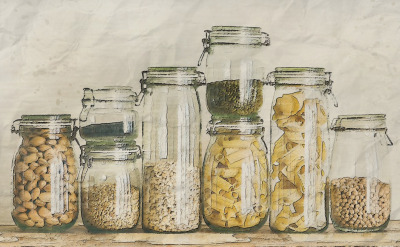
Basic Food Storage
Food storage and preparedness requires a commitment in time and resources. Additionally, some folks are overwhelmed with not knowing where to begin with what food items to acquire.
One basic list suggests acquiring the following: 20 pound bag of rice, 20 pound bag of beans, 20 cans of fruit, 20 cans of veggies, 20 cans of meat (chicken, tuna, or roast beef), 2 large containers of peanut butter, 2 large containers of Tang / Crystal light or alternative, 1 large bag of oats, 1 large bag of salt, 2 gallons of olive oil and 1 large container of honey.
The above list is merely a suggestion, and you may alter and replace food items based on your individual and family needs. Ideally, the food that you store for your family should be food they are accustomed to eating, and that they will enjoy.
One suggestion is to plan an occasional dinner using only food storage items. This will help you get use to cooking these foods, experimenting with different dishes, acquiring a taste for them, or adding ingredients to alter the flavor to make it more palatable for your family.
In addition to the basic list suggested above you may want to include comfort foods (ex. macaroni & cheese) your kids and family members especially enjoy. You may also want to add hard candy as a treat.
Lastly, food storage and emergency preparedness can appear to be overwhelming when you consider all of the things that it encompasses. However, the universal principle of “divide it into small jobs” enables each of us to accomplish extraordinary projects by doing a little bit each day.

Planning for the Unexpected
We don’t like to think of events occurring outside of our normal routine, and often believe unexpected things will not happen to us. However, emergencies, life events, and weather related events occur regularly and can be very challenging when we are unprepared.
A critical aspect of preparedness is planning and preparing for the unexpected. A good way to prepare for the unexpected is to play the “what-if game.” The what-if game encourages you to list as many unexpected events as might occur outside your normal routine that could alter your life, then list ways you would counteract those unexpected events.
For example, what if roads are closed because of an emergency and you can’t make it back home? Where would you go? What options do you have? What if you or your spouse, or both you and your spouse lose your jobs? Are there items you could sell to help offset the income loss? Do you have food storage you could use until you become re-employed? What if your home is damaged from a major storm and authorities deem it unlivable? Do you have friends or family near where you could go?
As you can see, preparedness is much more than having ample food and water in your home. Your preparedness plans should also include having an easily accessible 72-hour kit to grab if you had to immediately leave your home. A 72-hour kit of basic essentials should be available for every family member, including pets.
Lastly, based on the length of time we spend in our vehicles, the threat of traffic accidents, breakdowns, and unpredictable weather patterns requires that we outfit each vehicle we use with emergency and preparedness items.